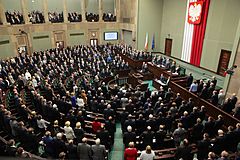
Back Sejm Afrikaans سيم (برلمان بولندي) Arabic Sejm AST Сейм Рэспублікі Польшча Byelorussian Сойм Польшчы BE-X-OLD Sejm Breton Sejm Catalan Sejm Czech Sejm Danish Sejm German
Sejm of the Republic of Poland Sejm Rzeczypospolitej Polskiej | |
|---|---|
| 10th term | |
 | |
| Type | |
| Type | of the Polish parliament |
| History | |
| Founded | 1493 (historical) 1921 (contemporary) |
| Leadership | |
Monika Wielichowska, PO Dorota Niedziela, PO Piotr Zgorzelski, PSL Włodzimierz Czarzasty, NL Krzysztof Bosak, RN since 13 November 2023 | |
| Structure | |
| Seats | 457 deputies (228 majority) |
 | |
Political groups | Government (238)
Opposition (211) Vacant (3) |
| Committees | 29
|
| Elections | |
| Open-list proportional representation in 41 constituencies (5% national election thresholda) | |
Last election | 15 October 2023 |
Next election | On or before 11 November 2027 |
| Meeting place | |
 | |
| The Sejm and Senate Complex, Warsaw | |
| Website | |
| sejm | |
| Footnotes | |
| a 8% for coalitions, 0% for ethnic minority electoral committees | |
The Sejm (English: /seɪm/, Polish: [sɛjm] ⓘ), officially known as the Sejm of the Republic of Poland (Polish: Sejm Rzeczypospolitej Polskiej), is the lower house of the bicameral parliament of Poland.
The Sejm has been the highest governing body of the Third Polish Republic since the transition of government in 1989. Along with the upper house of parliament, the Senate, it forms the national legislature in Poland known as National Assembly (Polish: Zgromadzenie Narodowe). The Sejm is composed of 460 deputies (singular deputowany or poseł – "envoy") elected every four years by a universal ballot. The Sejm is presided over by a speaker called the "Marshal of the Sejm" (Marszałek Sejmu).
In the Kingdom of Poland, the term Sejm referred to an entire two-chamber parliament, comprising the Chamber of Deputies (Izba Poselska), the Senate and the King. It was thus a three-estate parliament. The 1573 Henrician Articles strengthened the assembly's jurisdiction, making Poland a constitutional elective monarchy. Since the Second Polish Republic (1918–1939), Sejm has referred only to the lower house of parliament.
During the existence of the Polish People's Republic, the Sejm, then a unicameral parliament, was the supreme organ of state power in the country. It was the only government branch in the state, and per the principle of unified power, all state organs were subservient to it. However, in practice it was widely considered to be a rubber stamp legislature which exists to approve decisions made by the ruling party, the Polish United Workers' Party (PZPR) as a formality, and which has little to no real power of its own.
Cite error: There are <ref group=lower-alpha> tags or {{efn}} templates on this page, but the references will not show without a {{reflist|group=lower-alpha}} template or {{notelist}} template (see the help page).